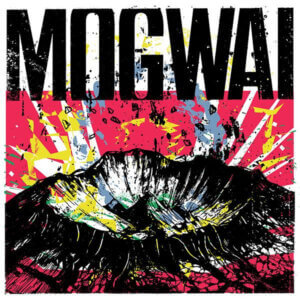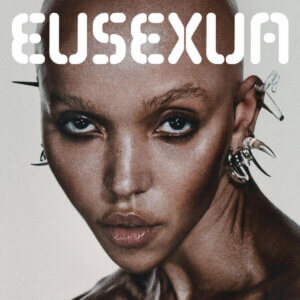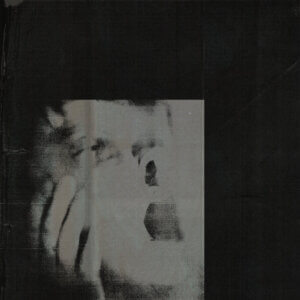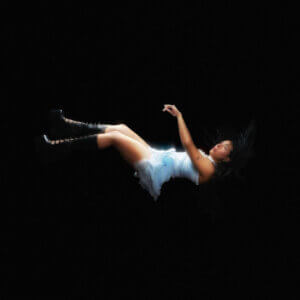Reflections in Wonderland: Pom Pom Squad finds themself in new record
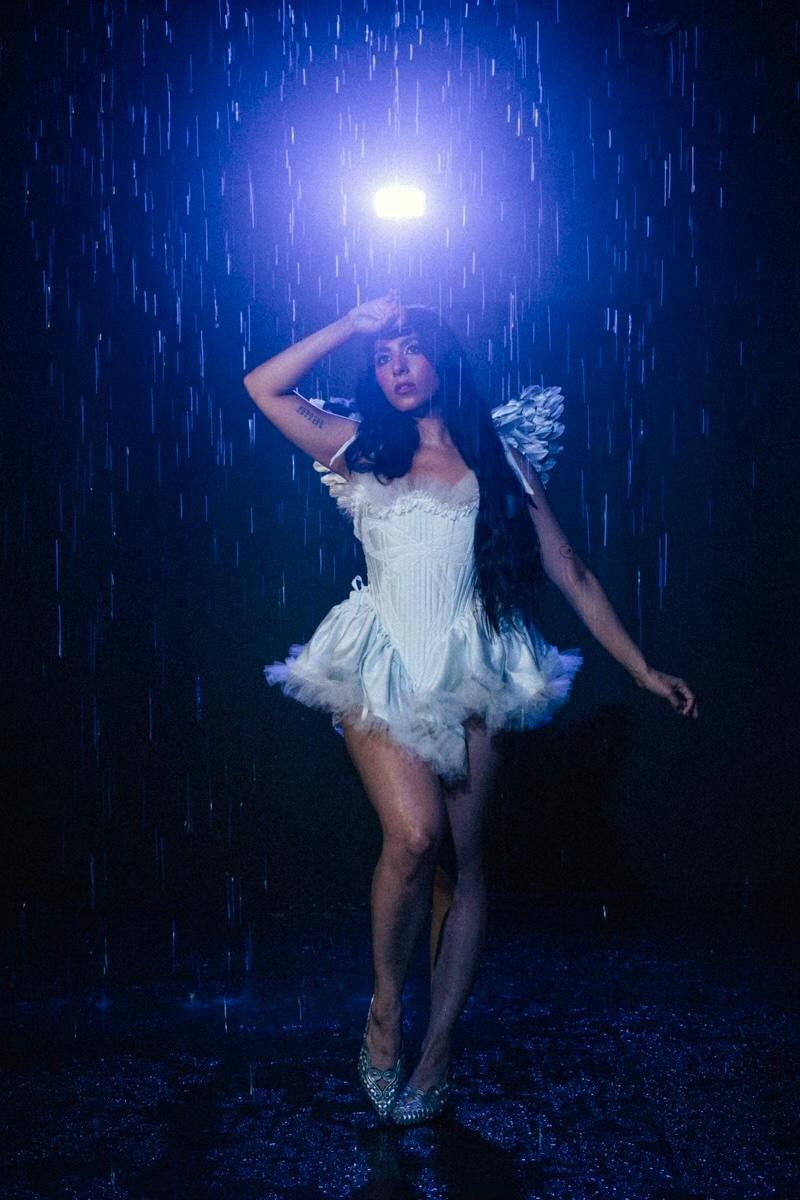
In moving forward in her artistic practice and personal growth, Pom Pom Squad’s Mia Berrin retreated to her childhood to lay down the groundwork for the long-awaited follow-up to the band’s critically acclaimed 2021 debut, Death of a Cheerleader. The result is the brutally candid and enveloping Mirror Starts Moving Without Me, a record brimming with vulnerability that earnestly chronicles universal insecurities. Berrin’s self-examinations across these eleven songs stop you in your tracks for their arresting honesty laced with painful revelations about her inner-self. The claustrophobia in her mind is effectively recreated through a dark tonal palette that recalls Mitski and Billie Eilish in how she melds infectious pop hooks with captivating textured punk and art-rock arrangements. It’s a multi-faceted work that explores all aspects of the twenty-something experience.
Over Zoom, Northern Transmissions spoke with Mia Berrin about the challenges she faced approaching Mirror Starts Moving Without Me, the valuable lessons learned through the process and how she feels the experience has made her a better artist.
NT: Congrats on Mirror Starts Moving Without Me. It’s been out for a little while now, how has this record release been different to Pom Pom Squad’s debut Death of a Cheerleader?
Mia Berrin: It’s weird because I barely remember what it was like when Death of a Cheerleader came out. I think that I’ve had to mentally prepare for [Mirror Starts Moving Without Me] because it’s much more, not that Death Of A Cheerleader wasn’t vulnerable, but this one’s vulnerable in a different way.
The nice thing about putting out your first album is that you hope for the best but for better or for worse because no one’s really looking out for it. So, all of the good stuff is such a blessing and a surprise and I think twitch this one, you know, with a second album, that’s when there’s more expectation around it. People have more expectations and so there’s a lot more to contend with. You put it out and you hope people like it! I’ve been really pleasantly surprised by the response. For the most part, people have been really kind about it and I’m so grateful for that.
NT: That’s amazing! I was wondering what your level of engagement with reviews for Mirror Starts Moving Without Me has been like because in the album’s accompanying text you mentioned how external voices and opinions following the debut had an impact on your confidence. Has that impacted the way that you’ve approached reading reviews this time?
Mia Berrin: Yeah, definitely. I tried to avoid reviews more this time. I told my friends and my family that if it’s something that’s really nice they can send it to me, otherwise I don’t need to see it. The good news is that I got sent a lot of stuff because my family thought that I would like to see it. It was nice, in a way, because I think the avoidance, it’s so complicated because there are a couple publications for me that I associate with my inner-critic, or publications that I was a fan of growing-up so when they review it I don’t want to read it because I don’t want to be disappointed. I’m proud of myself, in a way, because there was one that apparently was good but I just knew for myself that if I read it, no matter what, it would do something to me. So I avoided it altogether. Apparently it was a very kind review, but I just didn’t want to know and I didn’t read it. Honestly, it’s kind of a nice feeling knowing that I can allow myself to detach in that way. But, yeah, I saw some negative comments about myself and I saw some really nice reviews that made me cry. Overall, I felt really measured about the whole thing and I’m proud of myself for that.
NT: The lyrics throughout Mirror Starts Moving Without Me are so striking and stark in how you convey your vulnerability. In the early stages of making the album, did you find that you turned to writing music as a form of therapy? Especially coming from a period where your confidence was knocked following some of the reaction to your debut. How was it to write again?
Mia Berrin: Honestly, I took a little bit of a break from writing after Death Of A Cheerleader for a while and I don’t know if that's how I would do it again. I was talking about this a little bit today, looking at some of the benefits of being a beginner artist. One of the biggest benefits for every beginner artist, that we see as the biggest detriment, is that no one cares. No one is looking out for you and in so many ways that’s really freeing. That's actually a beautiful thing to want to be heard and to speak because you want your voice to be heard. Versus being in a place where you’re more well known or have more of a reputation, your reasons for speaking become different and your reasons for expressing yourself change. That was one of the main things that I had to contend with between this album and that one. I didn’t want to write an album for the sake of writing an album.
Making art and art, in general, has always been the thing that has made me feel the closest to myself and made me feel the most whole. And, you know, once that becomes your commercial interest or there’s status attached to it, It makes your relationship with your own creativity a lot more complicated. I think after Death Of A Cheerleader, I was touring a lot which was part of why I was writing less. Then, I got back after spending however many months out of my year playing songs that I wrote and I needed a break for a second, I think.
And then also it’s the other side of it, the commercial interest of it makes its way into your creative space and it sounds counterintuitive but I don’t write songs to make money, you know? That’s not where I’m at in my career. And it’s not an invalid thing to do either, there’s so many people who write songs purely for commercial reasons or they write songs for fun and then they become commercial. I think that’s more where I land on the spectrum. I found myself thinking, for a time, about the commercial aspect of it first and then thinking about myself and my creativity and what I wanted to express second. That was a sign for me that I needed to reconfigure a bit.
NT: How long of a break did you take from writing and coming through that reconfiguration process?
Mia Berrin: I was in a year-long period of writer’s block where I felt like nothing that I did felt good to me. Nothing felt like I was writing from a pure place. It’s been three years between Death Of A Cheerleader and Mirror Starts Moving Without Me and a lot's happened. It’s a long time to reflect on an era of your life.
NT: Songs like “Downhill” and “Spinning” are so visceral and vulnerable. What was it like sharing these songs with your band or friends and family for the first time? Were you nervous about them hearing how you were really feeling during that period?
Mia Berrin: For me, I have to get pretty far into a song before I start showing it to people. That was interesting this time because I co-wrote some of these songs with Cody Fitzgerald, who also co-produced the album with me. Even with Cody, we started a couple songs from scratch together and then there were a few songs where I had started things that I brought to him. I found that the way that I write best is that I have to start it. I have to dig into it enough to feel good about it and then I can brin it to my collaborators and so I think by the time the songs felt like they were in a good enough spot to show people, I felt at least pretty confident in them. I’m always the worst critic. So, if I can get past myself, then showing songs to other people is a lot easier!
NT: I was reading that you said that recording these vocals was one of the hardest creative experiences you’ve had and that there was a lot of crying while recording vocals on the first day in the studio. Were there any songs that were more difficult than others to get through? And, by the end of the recording process, did you find that you had gotten closure from the experience and felt a lot stronger as a person and artist from the recording process?
Mia Berrin: “Everybody’s Moving On” was pretty hard to finish, vocally. Most of them were challenging. There were definitely certain parts of songs that were more challenging than others. Above all else, I’ve learned a lot about myself as a vocalist over the past few years and finishing the songs, even listening to the finished vocals on the recording, I had a moment in the studio where I realized that I have to meet myself where I am today. I spent a lot of time, and currently spend a lot of time, wishing I was better than I am. I think I had to have a moment of acceptance while I was in the studio that there's nothing I can do about that right now. I am the singer that I am right now today in the studio and that’s the singer I have to bring to track. That was a very important lesson for me because some parts are harder to sing than things I’ve done before and getting to sing songs live in front of an audience, I feel like I’ve grown a lot as a vocalist. Even now, I can listen back and go ‘Right here’s what I would do differently next time,’ and hopefully I can bring that to the table next time.
NT: You co-produced Mirror Starts Moving Without Me and worked in Electric Lady Studios, which must have been so exciting and such an inspiring space to even be in. How did you find building the sonic world of the album? The arrangements are so big, enveloping and cinematic. Was it challenging or just a lot of fun creating the sonic identity of the album?
Mia Berrin: Yeah, absolutely. The production, for me, was the most fun part of the record and Electric Lady, I mean, it’s incredible! It’s such an incredible space and it really showed me that the space where you record really does matter. There’s just something about being there and how the rooms are treated, it’s either really technical or really just magical. There’s just something about being there that feels so special. It’s like the air sounds different, it’s just an incredible space to be in!
For me, being the producer, it’s like being in the driver’s seat a little bit. I like the driver’s seat everywhere except in a real car because I can’t drive! I like leading, it makes me feel a lot stronger. I feel like I can be strong for other people. I don’t always trust other people to be strong for me, that’s maybe a little deeper than I expected to go, but when I can be the producer, I feel like I can be strong for everyone. I can shape the sound and have a perspective about what we’re doing that I can’t always have as the artist. When I hear someone else playing their instrument I can say, ‘Ok, this is what I like about it, here’s what I wish they could do a little bit differently’.
When I hear myself as a vocalist, on a technical level I can go, ‘Okay, I can sing that note a little bit differently, or I can do this a little bit differently.’ But, on an emotional level, we’re all in our own heads so I’m saying to myself, ‘You’re bad and that’s bad.’ It’s really easy to lose that perspective being a performer. And so, being a producer, I like knowing that I can make the performer feel comfortable and confident and excited about trying new things. Versus producing me, I feel bad for my friends! I can be very in my head.
So, that was a real joy and that’s also why I’m so grateful to have Cody on the other side of it co-producing because he helped me find that perspective outside of myself which allowed me to be more objective. He was my eyes and ears on the ground, in a way. It was really incredible to feel like we had each others backs on this project. I had a lot of really incredible collaborators who helped me through the harder parts of the recording process.
Nt: You had some visual or figurative inspirations for the album like Alice In Wonderland, Sailor Moon and Mima Kirigoe from Perfect Blue. I saw that you also created a playlist, as did your bandmates, with some of your favorite childhood songs. What were some of the songs from those playlists that you kept going back to in the studio?
Mia Berrin: Yeah, I made this playlist of everything from childhood to adulthood that I could remember that really affected how I hear and respond to music. It was so inspiring, I loved that assignment so much that I made everyone else do it, too. It was so crazy because I’ve been in a band with Shelby [Keller, drums] and Alex [Mercuri, guitar] for six years and I’ve known Lauren [Marquez, bass] from the band for two or three years now. But Cody and Lauren didn’t meet before the sessions but the amount of songs that we all had in common was staggering! It showed me clearly that I had assembled the right group of people and it’s honestly an assignment that I’m probably going to give anyone I work with in the future. I started talking to Daniel Neiman who mixed the album and he also made a playlist and seeing his songs I was so shocked by the crossovers happening.
It really showed me that during the process of making the album I was interrogating a lot of where taste or preference comes from. I do think we’re born with so much of what we are drawn to. It was spurred by this conversation I had with my mom about Sailor Moon and being an American kid, at the time I lived in Detroit, and being interested in anime was a weird niche and I asked my mom how did that start and how do we express interest in the things that we’re interested in and she said that if I was in a toy store, I just always wanted the Sailor Moon doll. And I was like, ‘What is that? Where does that come from?’
I think about how the development of music taste in the same way. I tried to reconnect with what comes innately to me and what comes naturally to me. My playlist was a lot of Prince and the Beatles, they were a big band for me growing-up. When I was a teenager, I got into FKA Twigs, who is still one of my favorite artists of all time. There’s some Riot Grrrl stuff on there, singer-songwriter stuff. It really runs the gamut, my playlist. It was also an important exercise for me in realizing that I'm not just one type of artist. It allowed me to experiment more with sound in a way that was really exciting.
NT: Finally, what would you say that you're most proud of with Mirror Starts Moving Without Me and how did the whole experience of making it inform your artistic and personal growth for what you do next?
Mia Berrin: I think that I’m proud, overall, that I saw this project through because it was not easy. There are so many things about this process that if I could go back and do them differently I would. But, I think that it was a really important lesson for me to learn that I need to allow things to happen the way that they are. I’m really grateful for how far I’ve come because of this project. Now being on the other side of it, I feel like I’m a much more balanced artist. I feel like I understand my creativity a lot more and how to maintain a healthier and better routine for myself. I’m trusting my instincts a lot more and allowing myself to be a little bit less of a perfectionist. It was a very important project for me and I’m just so grateful that people like it!
order Mirror Starts Moving Without ME HERE
Latest Reviews
Tracks
Related
Advertisement
Looking for something new to listen to?
Sign up to our all-new newsletter for top-notch reviews, news, videos and playlists.
